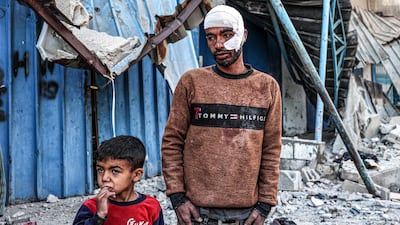Live updates: Follow the latest news on Israel-Gaza
More than 10,000 ill or injured Palestinians require urgent evacuation from the Gaza Strip to receive proper medical care that could save their lives, the Hamas-run Health Ministry said on Wednesday.
"There are 11,000 sick and injured people who are in desperate and urgent need to leave Gaza for life-saving treatment," ministry spokesman Dr Ashraf Al Qudra said.
Nearly 350,000 people trapped in Gaza are in need of life saving medicine, the ministry added.
More than 27,700 Palestinians have been killed and 67,147 injured in Israeli strikes on Gaza since October 7, it said, adding that in the past 24 hours alone, 123 were killed and 169 injured.
Spread of disease
The Euro-Med Human Rights Monitor on Wednesday said Israeli starvation of civilians in the strip will have long-term consequences on the population.
The number of Palestinians suffering from starvation and other diseases may surpass those killed during the war, reports and international experts said in a policy paper titled Gaza Strip: A Stage for Genocide Since October 7th and a Potential Famine Area by February 7th.
The monitor assisted in providing an analysis on the catastrophic food situation in the enclave and indicators of the onset of famine, especially in Gaza city and northern areas.
The paper detailed that, under optimum conditions, humanitarian aid entering the strip from the south was carried on 70 to 100 lorries, only two of which were destined for Gaza city and the north.
However, before October 7 the daily number of cargo and aid lorries entering was at least 500.
Lima Bastami, legal director at the Euro-Med Monitor, said the amount of incoming aid was not meeting the basic needs of the population.
"Their needs are increasing due to the inhumane conditions, genocide, power cuts and shortages of electricity, water and fuel," she said.
She warned approximately 53 per cent of the population in the Gaza Strip would experience severe malnutrition this month.
Meanwhile, 26 per cent of the population, about half a million people, will suffer from famine, leading to an increase in deaths caused by hunger, malnutrition or related diseases.
Trapped civilians
Citizens trapped in the southern city of Rafah, near the Egyptian border, are concerned there is nowhere to go following threats of Israeli attacks.
Amira Ismael, who fled Gaza city for Khan Younis and then on to Rafah, is worried about the fate of her children.
“Where can we go now? There are no remaining areas in Gaza Strip," she told The National.
Ms Ismael said she was concerned about her children's psychological welfare as their only memories are of the war.
“Every couple of years we witness a new war, my eldest daughter is 10 and she has experienced three wars,” Ms Ismael said.
Naziha Fazaa, who is waiting for her name to be listed so she can leave the Gaza Strip to join her fiance who is in the US, is counting down days before departure.
“I was supposed to be married this summer but with the current situation and the war there is no hope to have a wedding in Gaza," she told The National.
She lived in Gaza city but fled to Khan Younis, then to Al Mawasi then eventually to Rafah.
“All our plans have changed and now our future is unclear, all of that because we are Palestinians and live in Gaza,” she said.


